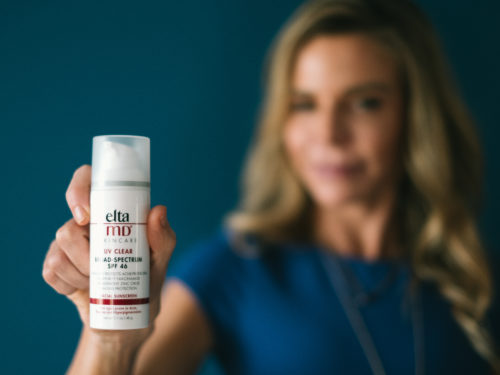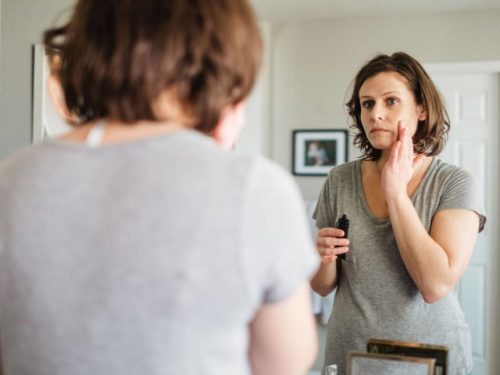What skin care products should I be using every day?
by Elizabeth Janowski
I often get asked by friends and acquaintances what skin care products they should be using – and what brands I recommend. Certainly, navigating the billion dollar skin care industry is complicated and confusing. And with new products and brands entering the marketplace all the time — each making their own amazing claims — it is difficult to know how to make the most effective choices.
Because of my role at Sonata, I have been fortunate enough to be exposed to medical-grade skin care products and skin care education- and have been using the same regimen for 6 years. In that time, my skin has aged in reverse. Along with chemical peels and microneedling treatments, and a laser resurfacing procedure 4 years ago, I have been able to maintain healthy, youthful skin that looks better than it did a decade ago.
SUNSCREEN: Your best friend
The absolute most important thing I tell people is to use sunscreen – every day – and to reapply throughout the day. Sunscreen only lasts about 2-3 hours, so the sunscreen you put on this morning will be gone by the time you take your afternoon walk. I reapply if I go out for lunch, and before I hop in the car to pick up my kids from school. Many people are concerned about messing up their makeup, but I recommend you find a sunscreen that you like and that is light enough to reapply over makeup. Sun is your skin’s number one enemy – breaking down collagen and discoloring skin. A tan today is just an accumulation of sun damage … and damaged skin will always come back to haunt you.
A good sunscreen is one that says “Broad Spectrum” on the label and offers both UVA and UVB protection. The SPF doesn’t matter – and any SPF of 40 or more is just about equal. The best sunscreens have a predominance of ingredients that offer a “physical block” like Zinc Oxide or Titanium Dioxide. Many people don’t like the white hue of a sunscreen – but that white is the physical block that literally stops the sun’s rays from breaking down your skin cells. We carry many tinted versions of broad spectrum sunscreen which offer a great protection and a little coverage – and I like to use the Skin Ceuticals tinted sunscreen as my foundation each morning.
VITAMIN- C: Your Morning Protection
Vitamin-C is an anti-oxidant, which means it blocks the free radicals released when your skin is exposed to sun. Vitamin-C can also help repair skin damage caused by sun exposure. You want to topically apply a Vitamin-C serum every morning, immediately after washing your face. Topical vitamin-C can also help the skin make collagen – keeping your skin taut and healthy-looking.
Every morning I use the Obagi Vitamin C serum right after washing my face. I then apply sunscreen and I am good to go for the day.
RETIN-A: Your Evening Renewal
Almost every one, except women who are pregnant or nursing, should be using Retin-A/Retinol at night. Retin-A, also known as tretinoin, is a form of Vitamin A that promotes cell turnover. When you use Retin-A at night, you are forcing your skin to exfoliate and renew itself. This keeps skin healthy, taut, and exfoliated (without any scrubbing). Retin-A can also help prevent breakouts by turning over skin cells regularly.
Some people have had bad experiences with Retin-A, and that is often because they started with too high of a dose. You should start using a lower dose – like .025 or .05, and use it every other day until your skin is able to tolerate daily usage. We also offer Renova which is a branded Retin-A in a cream base which is good for dry or very sensitive skin.
You use Retin-A in the evening because it makes your skin more sun-sensitive. And when using Retin-A, you MUST use sunscreen daily.
Retin-A is the most highly recommended and highly studied skin care product in the world, and is an essential ingredient in any skin care regimen.
I use .05 Retin-A every night.
The extras: Hydroquinone, Latisse
I am a person with a tendency to freckle and pigment, so I also use Hydroquinone products (4%) from the Obagi line. I use a product in the morning, and one in the evening as well that I mix with my Retin-A. I find these products help suppress pigmentation and keep my skin clear and beautiful.
People who are prone to melasma or hormonal pigmentary changes may also want to add in Hydroquinone products to their daily routine.
I also like Latisse, the eyelash growth product. When used regularly, it has helped me to grow and maintain thick, full eyelashes.
What can you skip?
Fancy Cleansers: You do need to wash your face to remove makeup and oils – and you generally want something gentle. I would shy away from abrasive products, and go with a cheap, gentle cleanser. We do sell inexpensive gentle cleansers from Obagi, but you can also buy something like Cetaphil over the counter at any drug store.
Expensive Moisturizers: When I was told that if you have healthy, well-exfoliated skin you could skip expensive moisturizers, my mind was blown. I thought you should spend the most money on a moisturizer. If you ask most women, at least in Colorado, they will say their number one skin problem is dry skin. Our aesthetician, and other skin care experts will tell you that dry skin is just skin that is not properly cared for. Start using Retin-A and do regular chemical peels and you likely won’t suffer from chronically dry skin. Save the money you would spend on a fancy cream and use it to get some Retin-A, Vitamin-C, and an in-office chemical peel four times a year.
Why Medical Grade?
Medical-grade skin care products, like the ones we carry from Obagi, Skin Ceuticals, Elta, and Skin Medica have to prove their claims. This means if they say that they treat a certain issue, they must prove through clinical trials to do so. Over the counter products are not held to the same standard. They aren’t required to do clinical testing or even to prove that they ingredients and the doses they claim are accurate. With a medical grade product, you know what you are getting.
Medical-grade products also can (and should) only be sold out of a physician’s office. That is because the doses of Retin-A, Vitamin-C, etc. are higher than what you could buy over the counter. This means the products are more effective and you are getting more “bang for your buck”.
Medical-grade may sound scary or expensive, but we often find our products are comparable or cheaper than one’s you might buy at a department store or Sephora.
I urge my friends and acquaintances to use medical-grade products and not to waste money on unproven or less effective products.
As with all things, a good skin care regimen takes commitment and time. If you stop using Retin-A or Latisse, you will notice the results will diminish.
Everyone’s skin is unique, and we can customize a protocol that works for your skin, your issues, and your budget. For example, we have great, effective choices for acne prone skin that may vary somewhat from my recommendations.
My Skin Care Regimen (it’s simple!)
Morning:
- Wash face with gentle cleanser
- Apply Vitamin-C Serum, Obagi
- Apply the Hydroquinone product Clear, Obagi
- Apply tinted sunscreen, Skin Ceuticals
- Apply powder, eyeliner and mascara
Mid-day:
- Reapply Sunscreen, I like the UV Clear from Skin Ceuticals – very light and goes nicely over makeup
Mid-afternoon:
- Reapply Sunscreen
Evening:
- Wash face with a oil based gentle cleanser
- Apply Retin-A .05% mixed with the Hydroquinone product Blender, Obagi
- Apply Latisse to my eyelashes
Schedule a consultation with Sonata Aesthetics today. Serving Broomfield, Denver, Westminster, Boulder, Arvada, and surrounding areas.
Liz Janowski
Related Posts

The secret to aging gracefully is…
The most important skin care product? Sunscreen! written by our Master Medical Aesthetician, Laurel Glenn...

1 crucial ingredient for amazing skin
Maintaining high levels of vitamin C is crucial for healthy, glowing skin Written by our Master Medical...

Glo skin care is here!
You have been asking for it! It’s finally at Sonata! Use coupon code SonataVIP for free shipping at our amazing...

